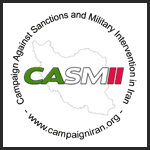WASHINGTON (Reuters) – Vice President Joe Biden said on Sunday the United States expects to gain China’s support for imposing sanctions on Iran over its nuclear program.
US Secretary of State Hillary Rodham Clinton has told an international conference that Iran has left the world little choice but to take harsher action to contain its nuclear program. Clinton told the US-Islamic World Forum in Doha, Qatar that Iran has not lived up to its nuclear obligations.
See Simon Jenkins Imposing idiot sanctions on Iran is a direct route to war and below Alistair Crooke (former spook so be advised) in Asia Times Online assessing the terrain wrote in December-
But if sanctions on Iran are widely acknowledged – at least in private within the US administration – as destined to fail, this must be provoking some interesting self-questioning within the White House: The US is in the process now of withdrawal from Iraq, it is looking for the exit in Afghanistan and the Israeli-Palestinian conflict is getting messier. None of these events seems likely to become particularly glorious episodes for the administration.
It is not hard to imagine White House Chief of Staff Rahm Emmanuel and White House senior adviser David Axelrod asking themselves, “why the president should want to risk another perceived failure” – as sanctions on Iran surely will be. “Why”, they may ask, “do sanctions and open ourselves to persistent Republican jeering at their inevitable failure and then ultimately force us to have to ask … well, what do we do next, Mr President”?
“Worse, will we,” they may ask, “be going into mid-term congressional elections with the Republicans raising that old Vietnam taunt that the ‘US Army did not lose in Vietnam – it was the politicians who stabbed the military in the back’ but with that same mantra now being used by our political enemies to depict Iraq and Afghanistan as failures of political nerve? Do we want to go into the midterm elections with failing Iran sanctions hanging like an albatross around our necks too?”
No doubt in this discussion one of the White House staffers will point out that, in the case of Iraq, sanctions were indeed pursued, despite the likelihood of their failure, but for one reason only: to entice the Europeans on board; to go through the diplomatic motions – so that the Europeans would have no choice but to accept the consequences of their failure. But this does not apply in the case of Iran, the officials might point out: Britain and France, and to a lesser extent Germany, are, on this issue, more committed to “imploding” the Iranian state – by “soft” war, if not by “hot” war – than is Washington – so what would be the purpose of sanctions now?
We do not know the outcome to this hypothetical debate. We do not yet know that negotiations with Iran will fail; although it seems that the debate within the administration seems to be hardening against the idea of Iran retaining any enrichment capacity. If this does become the administration’s position, then failure of negotiations is assured. Iran will not abjure its right to a nuclear fuel cycle for power generation – even at the risk of war. This is the essence of the dilemma: if sanctions seem likely to lead to nothing more than Republican sniping and taunts of weakness, how does the president display “toughness” on Iran – against the backdrop of withdrawal from Iraq, Afghanistan and abstention on the Israeli-Palestinian political process?
It is clear that Israel must be reading the region in the same fashion. Israelis are acutely sensitive to US politics, and the Israeli media already express understanding for the acute dilemma that will face the US president if sanctions do not succeed in persuading Iran to abandon all enrichment (the Israeli objective). How might Israel see the way to help President Barack Obama resolve this dilemma – given the improbability that Israel will be given any “green light” to attack Iran directly, with all the consequences that such military action might entail for US interests in the region?
A recent article by the veteran and well-connected Israeli columnist, Alex Fishman, in the Hebrew language newspaper, Yediot Ahronoth, perhaps offers some insights into how Israelis may be speculating about such issues when he warns about “the approaching December winds”. These winds, Fishman tells us, will bring more and new revelations – not about Iran’s nuclear ambitions – but about Syria’s nuclear projects: the departure of Mohamed ElBaradei from the chair at the International Atomic Energy Agency (IAEA), he states, will open the door to new IAEA demands to inspect two suspected nuclear sites in Syria.
Fishman notes that, following the surfacing last month in Germany of stories that Israeli special forces had been on the ground covertly in Syria, no one should be surprised if more evidence and photographs of the nuclear reactor, destroyed by Israeli air attack in September 2007, come to dominate the headlines in the Western press this December.
The “star” turn in this prospective public relations campaign is to be evidence proving a direct Iranian nuclear connection and finance for Syria’s alleged nuclear project.
Fishman suggests that it suits “Israel’s internal as well as foreign PR efforts” for the time being to play along with talk of peace between Israel and Syria; but that both the December campaign against Syria’s alleged Iranian nuclear cooperation in the Western press, and the playing along with the Syrian peace track “are directly linked to negotiations” that the US is conducting with Iran. Fishman concludes that these could end in confrontation with Iran – “and also lead to a military strike”, in which case, “whomsoever is in the Iranian camp will also get a pounding” – a reference to Syria.
Does this piece truly reflect Israeli thinking? We do not know; but Fishman certainly is well connected. Does the Israeli security establishment really conceive that the road to military action against Iran passes through Damascus? For those who recall the tacit support given by Europe and the US to Israel’s 2007 surprise military attack on Syria, Fishman’s scenario is not as unlikely as it may seem.
That earlier episode could easily have escalated to a wider war. More likely is that this is but one of a number of “game changing” scenarios that Israel is considering, but which ultimately all have Iran as the “end game”.
In the past, Israel’s political parties of the right had a reputation for conceiving unconventional military actions, which sought to transform and invert the political paradigm of that time. Such actions did not always wait on, or seek, a US “green light”. There was not direct collusion with the US. Israeli leaders looked more to the direction of the political wind in Washington. It was viewed by Israelis historically as finding a creative way to help a US president “get to yes” – to borrow Obama’s own phraseology – by creating the public support and momentum to let a US president feel pulled forward by sentiment from a need to “hold Israel back”.
Is a new scandal of Iranian nuclear malfeasance and proliferation into Syria to serve as the pretext? Will a repeat of the 2007 air strikes on Syria lead to a wider conflict? Does the Israeli leadership think to ease Obama out of his Iran dilemma, by using the supposed “provocation” of a “Syrian-Iranian nuclear partnership” for a widening conflict? Perhaps we should beware these December “winds”?




















15 February, 2010 at 1:18 am
Ms. Clinton has been obsessed with getting my country into a war since at least 2007. She just won’t give up this fundamentalist Christian crusade.
15 February, 2010 at 7:17 am
With all due respect to the perfidity of the Clintons, American policy has clearly been to undermine the Nuclear NonProliferation Treaty under the guise of preventing terrorism. That was, after all, the exact train of events regarding neighbouring country Iraq. There is merely a matter of defining success as furthering the ‘Great Game’ and Oil Empire by undermining chosen states in oil producing regions. Though North Korea does not fit that definition to my knowledge, it is still on the Road to China.
I have a post of my whimsies on the topic
http://opitslinkfest.blogspot.com/2009/12/20-dec-mission-in-afghanistanetc.html
I saw a lamentable – but hardly unexpected – development on the U.S. ‘torture’ front http://www.truthout.org/obamas-doj-clears-torture-memo-authors-john-yoo-jay-bybee-professional-misconduct56531
15 February, 2010 at 6:07 pm
Funny that, because Cheney has now ‘admitted’ his role in torture: http://www.alternet.org/news/145671/dick_cheney_admits_to_torture_conspiracy
15 February, 2010 at 7:23 am
‘On the road to China’…what was I thinking ? Regardless, suppression of opposition is a basic manoevre of Empire.